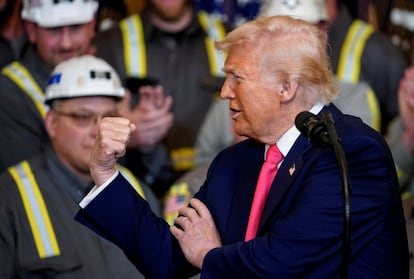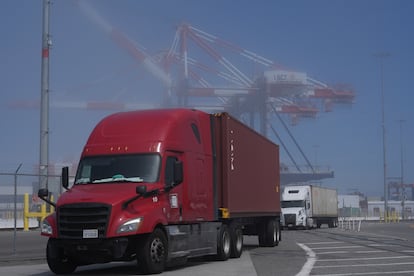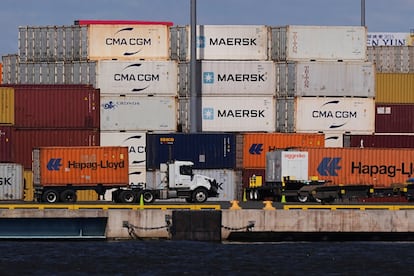Trump’s new tariffs take effect, hitting the global economy hard
US import levies are starting to be applied even as the president expresses openness to ‘tailored’ negotiations: ‘These countries are kissing my ass. They are dying to make a deal’


The United States has been surrounded by a tariff wall since just after midnight on Wednesday. The so-called “reciprocal” tariffs, steep import taxes that Donald Trump has decreed to punish countries with which the U.S. has a trade deficit, have gone into effect. Their implementation represents a blow to global trade and it threatens to plunge the U.S. economy, and with it, the global economy, into a recession. The tariffs starting to be applied to the majority of imports include 20% for products from the European Union and a whopping 104% for those from China.
Trump has already destroyed trillions of dollars in value with his trade war, the consequences of which he appears to have miscalculated. Asian stock markets opened sharply lower again on Wednesday following confirmation that the new tariffs would go into effect. Oil and other commodities also fell sharply. The U.S. president is willing to engage in negotiations to reach “tailor-made” agreements with each individual country. At a National Republican Congressional Committee dinner event on Monday, he said that “these countries are calling us up, kissing my ass. They are. They are dying to make a deal.”
Investors breathe a sigh of relief whenever negotiations are mentioned, and feel a chill when the prevailing thought is one of escalation. On Tuesday, Wall Street opened higher as messages from the White House about possible talks and agreements multiplied. However, as the day progressed, the impending implementation of the tariffs and the White House’s reiteration that levies on Chinese imports would be 104% disappointed investors and the market closed lower. The trade war rages on, and the damage is already being felt.
There is a mix of grievances, dogmatism and opportunism in Trump’s trade policy. On the one hand, there is the somewhat absurd conviction that global economic growth has hurt the United States, a country that is wealthier than ever and whose economy is the envy of the world, even though inequality has increased, understandably fueling discontent among broad segments of the population. On the other hand, there is a feeling that tariffs give Trump the power to use them as a negotiating tool to extract economic and non-economic concessions.
It’s true that the U.S. trade deficit is skyrocketing. Imports accelerated in the final stretch of 2024, in part to stock up ahead of Trump’s implementation of tariffs. The U.S. purchased $3.29 trillion in goods from abroad, with record imports from Mexico, and exported $2.08 trillion worth of goods. The trade deficit stood at over $1.2 trillion, compared to $1.1 trillion in 2023 and $1.2 trillion in 2022, the year the gap reached its previous record.
This imbalance partly explains Trump’s protectionist drive, which also targets the high tariffs imposed by other countries on U.S. products, as well as tariff barriers. However, Trump has not applied reciprocal tariffs as promised, but has instead calculated them arbitrarily based on the trade imbalance.
Last week, on “Liberation Day” (the third such day in the last six months, as per Trump’s own statements), the president displayed a sign showing the steep tariffs to be imposed on major trading partners: the European Union (20%); China (34%); Japan (24%); Vietnam (46%); Taiwan (32%); India (26%); South Korea (25%); Thailand (36%); Switzerland (31%); Indonesia (32%); Brazil, and the United Kingdom (10%). The Chinese tariff was added to another 20% imposed on that country as punishment for its production of fentanyl precursors. China retaliated with a 34% tariff, and Trump approved another executive order on Tuesday with an additional 50% levy on China. Thus, total tariffs of 104% went into effect at midnight on most Chinese imports. In addition, the U.S. president has punished Beijing by tripling tariffs from 30% to 90% on shipments of up to $800 from online companies like Temu and Shein, which are no longer exempt.
In search of deals
Trump reiterated his willingness to negotiate agreements at a White House event on Tuesday. The president spoke of taking in $2 billion a day with tariffs, although it is unclear when he intends to reach that goal or how much is currently being collected. “We’re doing very well,” he said after the stock market plunged again, wiping out more than $5 trillion in wealth in less than a week.
“We’re doing very well in making, I call them tailored deals, not off the rack. Right now, Japan is flying here to make a deal, South Korea is flying here to make a deal, and others are flying here,” said the president, surrounded by miners, another occupation Trump wants to boost in the United States by facilitating the use of coal for power generation.
The president asserted that his only problem is that he doesn’t have enough staff to carry out the negotiations. He spoke of using large private law firms, including some he has been intimidating with tailored executive orders to make their lives miserable if they don’t kowtow to him. “We’re gonna use them and we’re going to get them for the right price.” He claimed that a lot of countries now want to make deals and that “they’re all signing up.”

“We’ve had talks with many, many countries, more than 70, and they all wanna come in. Our problem is that we can’t see that many, that fast [...] For many years, we’ve been ripped off and abused by countries with the tariff situation; they’ve used tariffs against us. We didn’t use tariffs against them in any way [...] And now we’re doing it. We have tariffs on cars. We have tariffs on lumber, tariffs on steel and aluminum,” he said.

Trump, however, continues to send out contradictory messages, perhaps because his negotiating position would be weaker if he was seen to be faltering in his pursuit of an agreement after the damage done to the economy. Thus, a few hours later, at a charity gala for House Republicans, he said it was other countries, not the U.S., that wanted agreements: “We don’t necessarily want to make a deal with them. We’re happy as we are, making $2 billion a day, but they want to make a deal with us,” he said.
He also insisted that he will soon impose high tariffs on pharmaceutical imports, something he has been threatening for weeks. “We are going to announce a significant tariff on pharmaceutical products soon,” he said, without providing details about the planned levy. “Once we do this, they will come running back to our country, because we are the biggest market. The advantage we have over everyone is that we are the biggest market,” he added.
This type of erratic behavior, shifting positions, approving and suspending measures, and adding unexpected twists to the script, have increased uncertainty and seem to be slowing down spending and investment.
“I believe if I hadn’t become your president, I believe this country would have had problems like it’s never had before,” said Trump on Tuesday. Trump inherited a thriving economy that was growing at a rapid pace, had managed to control inflation, and had a historically low unemployment rate. The country is now on the brink of recession as a result of Trump’s erratic economic and trade policies.
The tariffs have gone into effect after Elon Musk, the world’s richest man and a close Trump ally, called Peter Navarro, one of the ideologues of this protectionism and Trump’s trade advisor, “dumber than a sack of bricks.” Navarro is among those who have spoken out against the negotiations.
Pimco, the world’s largest active fixed-income asset manager, with $1.9 trillion under management, is urging investors to abandon their hopes of rapid tariff concessions from Trump. In response to skeptics who believe the current announcements are a negotiating tactic and that relief will come soon, Pimco asserts that “the White House has remained defiant that tariffs are here to stay.” Its director of public policy, Libby Cantrill, believes there’s no need to delude themselves and that tariffs aren’t “posturing.” Trump has been preaching about higher tariffs since at least 1987, and his team firmly believes what he’s saying. While Pimco expects some sort of transaction from Trump, it cautions that “investors should think more in terms of months, not weeks.”
David Kohl, chief economist at Julius Baer, believes that “trade deal negotiations could be complicated and include retaliation and additional tariffs, but will ultimately result in agreements with lower trade barriers than those announced last week.” “However, the enormous uncertainty creates obstacles for global growth,” he adds.
Sign up for our weekly newsletter to get more English-language news coverage from EL PAÍS USA Edition
Tu suscripción se está usando en otro dispositivo
¿Quieres añadir otro usuario a tu suscripción?
Si continúas leyendo en este dispositivo, no se podrá leer en el otro.
FlechaTu suscripción se está usando en otro dispositivo y solo puedes acceder a EL PAÍS desde un dispositivo a la vez.
Si quieres compartir tu cuenta, cambia tu suscripción a la modalidad Premium, así podrás añadir otro usuario. Cada uno accederá con su propia cuenta de email, lo que os permitirá personalizar vuestra experiencia en EL PAÍS.
¿Tienes una suscripción de empresa? Accede aquí para contratar más cuentas.
En el caso de no saber quién está usando tu cuenta, te recomendamos cambiar tu contraseña aquí.
Si decides continuar compartiendo tu cuenta, este mensaje se mostrará en tu dispositivo y en el de la otra persona que está usando tu cuenta de forma indefinida, afectando a tu experiencia de lectura. Puedes consultar aquí los términos y condiciones de la suscripción digital.








































